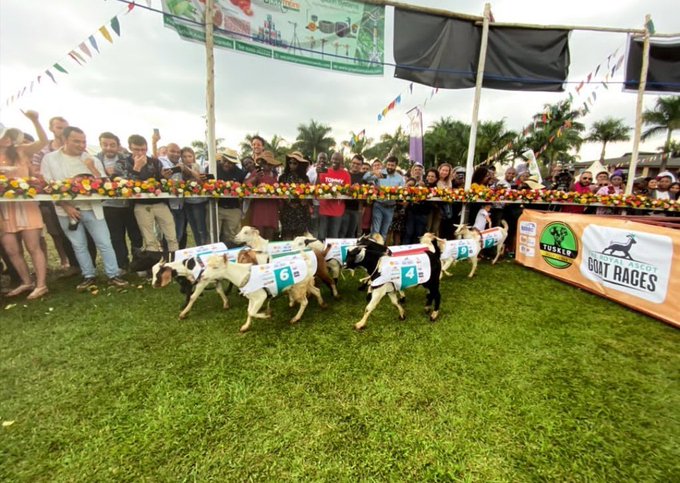David Bahati, the Minister of State for Trade
The Ministry of Trade says trade, Industry, and Cooperatives contribute an estimated 26.0% to the GDP.
David Bahati, the Minister of State for Trade, made the revelation on Wednesday at the Office of the President Auditorium, while updating the public about the ministry’s performance in line with the NRM’s 2021-2026 manifesto commitments and implementation.
Bahati says that during the period under review, manufacturing sub sector contributed 16.5% to the total GDP. In addition, he said manufacturing sub sector registered growth of 3.9% in 2022/23 from 2.2% in 2021/22, offered direct employment to over 2,000,000 million people. According to Bahati, manufacturing sub sector consumes about 65% of the total electricity generated and contributed 22.62% (Ugx 5.1 Trillion) of the total tax revenue collections.
He said this is part of the accelerated diversification of the economy from overreliance on agriculture.
Bahati said the government is implementing an extensive import substitution in order to reduce the import bill, especially on basic consumer goods.
“In the Manifesto 2021 – 2026, the Government is to concentrate most of its resources on addressing the following; (i) Low level of industrialization (ii) Limited export markets (iii) Low Labour productivity. To address the low levels of industrialization, Uganda Development Corporation (UDC) has invested in a total of 18 ventures that cut across 4 major sectors which are; agro-industry, infrastructure services, construction, and hospitality. 1. Agro-industry. This forms the bulk of UDC’s investment portfolio and currently, there are 9 investments in agro-industry distributed across six commodities of tea, sugar, cotton, cassava, coffee and fruits. a. Tea UDC has invested in four tea factories that process black tea for domestic and export using CTC technology. These are; i. Kayonza Growers Tea Factory located in Kanungu district. It has an installed capacity of 3 CTC lines with an input capacity of about 180 MT per day of green leaf; The company earned $4.48m in export of black tea. ii. Kigezi Highland Tea Factory in Kabale and Kisoro. It has an installed capacity of 2 CTC lines one in Kabale and another in Kisoro with a total input capacity of about 100 MT of green leaf per day. The company has created 247 and 18,525 direct and indirect jobs respectively. The company earned $4.3m in export of black tea to Mombasa. iii. Mabale Growers Tea Factory in Kabarole. It has installed capacity of 2 CTC lines with a total input capacity of about 120MT per day of green leaf. The company employs 307 people directly and created 23,025 indirect jobs. The company earned $1.56m in export of black tea,” said Bahati.
According to Bahati, Mpanga Growers Tea Factory in Kabarole has an installed capacity of 2 CTC lines with a total input capacity of about 120 MT per day of green leaf.
“Mpanga employees 330 directly and created 24,750 indirect jobs. The company earned $1.24m in export of black tea. Sugar. Horyal Investment Holding Company (Atiak Sugar Factory). UDC has procured 84 units of earth moving equipment, 100 units of agriculture farm equipment and 52 units (service trucks, haulage trailers and tractor heads) for Atiak sugar factory. Horyal Investment Holding Company Ltd (HIHC) has adopted new technologies such as pivot irrigation system which involved the installation of 62 center pivots covering 8700 hectares of land at Atiak sugar factory. Cotton. UDC has invested in Mutuma Commercial Agencies Ltd located in the Luuka district and the factory is operational. The company is engaged in surgical cotton, cotton cake, soap stock and cotton seed oil. The company has a ginning capacity of 2,590 MT/year. The cotton wool facility on the other hand has an installed capacity of 475MT per annum. There has been an increase in farmers’ income UGX 229 million in 2023 to UGX 703 million in June 2024. The company employs 136 people directly and created 1000 indirect jobs,” Bahati added.
Bahati says that UDC has invested in Soroti Fruits Factory Ltd located in Soroti District. The factory has an installed processing capacity of 6 MT/hour for mangoes and 6 MT/hour of oranges into puree/concentrates and also ready-to-drink juice.
“SOFTE has had an increase in the uptake of fruits purchased from the smaller holder farmers from 588 MT in FY 2022/23 to 1210 MT in FY 2023/24. The company sells its products locally and to the EAC Region. SOFTE employs 97 people directly and 7,275 are indirect. The company earned $0.57m in export of pulp and concentrates,” said the Minister.
Bahati says that domestic demand for cotton wool is higher than the available local capacity to supply and thus the country relied on imports. According to Bahati, Uganda registered an increase of 45% in the value of surgical cotton imported from USD 167,023 in 2016 to USD 919,091 in 2018.
This increase indicates the domestic demand for surgical cotton is increasing, said the Minister.
He adds that UDC is exploring possibilities of setting up a fruit processing factory in Luwero Sub region. The proposed Luwero fruit processing factory will have three (3) processing lines. The product space shall be dried pinneaple/mangoes, canned pineapple and ready to drink ginger flavored pineapple juice (Munanasi). He added that UDC in partnership with the Alur Kingdom are in advanced stages of setting up a tea processing factory in Zombo district. The proposed tea factory has an output capacity of 600 kg/hour.
He revealed that UDC in partnership with scientists from Makerere University (FONUS) and the farmers in Yumbe district have set a fruit processing factory in Yumbe with a prodution capacity of 5MT per hour. Currently, Bahati said civil works are being finalized.
“UDC is exploring the possibility of establishing a sheet glass plant in Masaka district to fully exploit the abundant pure white silica sand deposits in the area. This would drastically transform the economic environment in the whole region,” added Bahati.
He said the government is in the final stages of setting up sugarcane value-addition incubation centres in each district of the Busoga sub-region.
“A farmer-owned sugar factory – Busoga Sugar Factory shall be implemented with an expandable daily crushing capacity (TCD) of 1250 MT of sugarcane to be established in Luuka District, Busoga region. The project will provide sustainable and better pricing of cane to the farmers as a socio-economic tool for increasing household incomes in Busoga. To date, Location analysis for the factory land was finalized by NPA and UDC is in the process of procuring land for factory operations,” said Bahati.
Bahati noted that the government is scaling up commercial diplomacy to market Uganda’s products, tourism, and our investment potential. Under this arrangement, he said Uganda has accessed markets in Nigeria, Algeria, East Africa etc.
He said that the government intends to promote motor vehicles, tractors, and other assemblers in Uganda through the BUBU policy, we will buy from them an agreed number and type of products annually.
To this, he said that Motor vehicle, tractor, and other assemblers, assembling semi-knocked down (SKD) vehicles are available in the country. He noted that the government is tapping into the export market, NRM will facilitate local industries in attaining good manufacturing practices (GMP) compliance, which is globally recognized.
He says that the government intends to work with the EAC sister countries to take full advantage of the customs union and remove all non-trade barriers to enhance trade in the region.
Bahati says that the UDC will continue supporting the private sector to invest in tea factories to increase value-addition.





